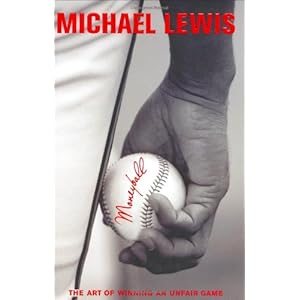
Are you looking to buy Moneyball: The Art of Winning an Unfair Game? here is the right place to find the great deals. we can offer discounts of up to 90% on Moneyball: The Art of Winning an Unfair Game. check out the link below:
>> Click Here to See Compare Prices and Get the Lowest Price Offers
Moneyball: The Art of Winning an Unfair Game Review
Lewis, who previously wrote some of the best books on Wall Street's go-go '80s (Liar's Poker) and Silicon Valley's go-go '90s (The New New Thing), here turns his attention to professional baseball. Now, I should preface this by saying that I used to love baseball and these days it doesn't interest me much at all. There was a time when I was a total stats geek, I bought all the Bill James abstracts, played tabletop games, etc., but a combination of playing in college and the escalating money completely turned me off to the game. I knew this was supposed to be a good book but had no intention of reading it until Nick Hornby's rave review in his column in The Believer. I figured if one of my favorite British novelists liked the book, there must be something to it. I picked it up and within ten pages I was totally hooked.The basis for the book is the question of how the Oakland A's, one of baseball's poorest teams as measured by payroll, managed to win so many games in the first few years of the new millennium. Lewis's potentially boring answer revolves around inefficiencies in the market for players, but he weaves this story around the A's General Manager, Billy Beane. Now, if you have some axe to grind with Beane, you might as well not read the book, 'cause Lewis tends to be rather fawning in many places. Still, Beane's own background and mediocre career form the perfect framework upon which to build this story about evaluating baseball talent. Beane was a hugely athletic, "can't miss" prospect, who turned down a joint football/baseball scholarship from Stanford to sign with the New York Mets out of high school. His pro career turned out to be utterly undistinguished, and this disconnect is what drove him to seek new methods of scouting and evaluating baseball talent. It also helped matters that the A's new owners refused to spend any excess money, and demanded that the team be treated as a business. Beane jettisoned conventional scouting wisdom (and to a certain extent, methods), to focus on statistical indicators not widely followed inside baseball. Here, the book takes a detour into the realm of "sabremetrics" (the statistical analysis of baseball), and various attempts to arrive at more meaningful ways to calculating a player's offensive value.
The result of developing a criteria of player valuation that was radically at odds with the prevailing wisdom of the market was that Beane was able to get the players he liked for very cheap. The rest of the book is devoted to detailing this process. Chapter 5 is probably the best, detailing how the A's orchestrated the 2002 amateur draft so that they got an inordinate amount of players they coveted for below market value. Chapters 6 and 7 discuss the loss of their three star players after the 2001 season and how managed to compensate for this. To show the Beane methodology in action during the season, the reader is taken inside several trades and roster moves. This includes a chapter on the mid-season trade for relief pitcher Ricardo Rincon, bracketed by chapters detailing Beane's pursuit of certain players who were not considered major-league material (Scott Hatteberg and Chad Bradford). The book ends on a valedictory note, as the A's set a record by winning 20 games in a row and other teams start to buy in to their methods.
It should be noted that the book is far from perfect. Lewis has an unfortunately tendency for repetition when it comes to important points and themes, hammering them home, again and again. And although he does point out many of Beane's logical inconsistencies and emotional flaws, Lewis does often come across as more of an enamored fan than a strict journalist. Some critics feel that the A's success detailed in the book was based on several star players obtained the old-fashioned way, thus disproving the whole premise. However, it has to be understood that the practices detailed in the book can't really be proven to work one way or another for another decade or so. Still the insights into challenging conventional thinking and searching for alternative data or data patterns will likely appeal to readers of Lewis' other works and are applicable far beyond baseball. And while the jury is still out, several other teams have since hired general managers with the same basic philosophy as Beane. Ultimately, it's an interesting story, and one that Lewis tells very well -- even for non baseball fans.
Moneyball: The Art of Winning an Unfair Game Overview
Want to learn more information about Moneyball: The Art of Winning an Unfair Game?
>> Click Here to See All Customer Reviews & Ratings Now
0 comments:
Post a Comment